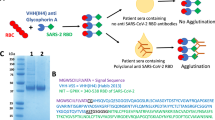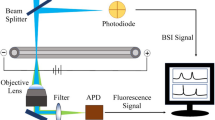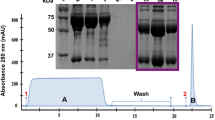Abstract
ALTHOUGH it has rarely been used for this purpose the microelectrophoretic technique1 is well suited for the detection of antibody adsorbed to bacterial cells. The antigen–antibody reactions between a single strain of Streptococcus pyogenes type 6 matt variant (N.C.T.C. 8302) and antisera for its type-specific M and T antigens, and for the group specific C antigen, have been investigated in this way. The type-specific sera were fully absorbed to remove heterologous cross-reactions. The group-specific sera were unabsorbed but showed no cross-reactions with other groups.
This is a preview of subscription content, access via your institution
Access options
Subscribe to this journal
Receive 51 print issues and online access
$199.00 per year
only $3.90 per issue
Buy this article
- Purchase on Springer Link
- Instant access to full article PDF
Prices may be subject to local taxes which are calculated during checkout
Similar content being viewed by others
References
Gittens, G. J., and James, A. M., Anal. Biochem., 1, 478 (1960).
Hill, M. J., James, A. M., and Maxted, W. R., Biochim. Biophys. Acta, 66, 264 (1963).
Hill, M. J., James, A. M., and Maxted, W. R., Biochim, Biophys. Acta, 75, 402 (1963).
Author information
Authors and Affiliations
Rights and permissions
About this article
Cite this article
HILL, M., JAMES, A. & MAXTED, W. Application of Particle Electrophoresis to the Detection of Antibody bound to Cells of Streptococcus pyogenes. Nature 202, 187–188 (1964). https://doi.org/10.1038/202187a0
Issue Date:
DOI: https://doi.org/10.1038/202187a0
Comments
By submitting a comment you agree to abide by our Terms and Community Guidelines. If you find something abusive or that does not comply with our terms or guidelines please flag it as inappropriate.



